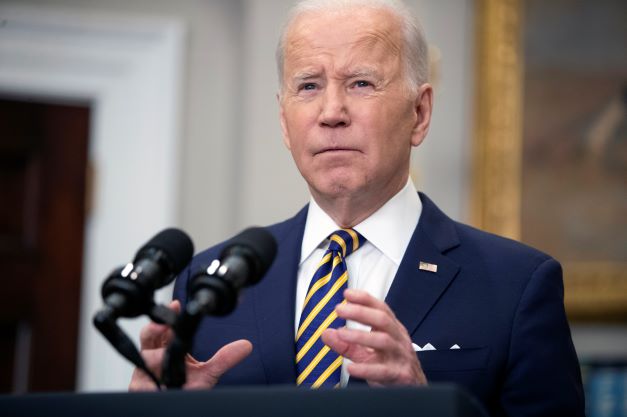Biden asks Congress to approve $33 billion more in emergency aid for Ukraine
By Peter Baker and Emily Cochrane
WASHINGTON — President Joe Biden called on Congress on Thursday (28) to approve $33 billion in additional aid for Ukraine, arguing that American weapons and humanitarian assistance are helping to beat back Russian invaders in a conflict with enormous consequences for the United States and the world.
“The cost of this fight is not cheap,” he said in a statement made at the White House, addressing domestic concerns about the expense. “But caving to aggression is going to be more costly if we allow it to happen.”
“We either back the Ukrainian people as they defend their country or we stand by as the Russians continue their atrocities and aggression in Ukraine,” he added.
The enormous aid package would eclipse all the spending by the United States so far on the war and ramp up the United States’ investment not just in Ukraine’s defence but, more broadly, in weakening Russian military capacity, a goal outlined in recent days by Defence Secretary Lloyd Austin.
There is broad bipartisan support on Capitol Hill for more aid but it remained uncertain whether the issue could get tied up in negotiations over ancillary issues like COVID relief or immigration.
While Biden’s letter to Congress endorsed tying the Ukraine aid to a separate $22.5 billion pandemic response package, he told reporters he did not really care whether the two measures were linked or passed separately as long as both were approved.
The president also said he is sending lawmakers a legislative plan to make it easier to seize the assets of Russian oligarchs tied to President Vladimir Putin and direct some of those resources to the Ukrainians.
Biden said he will travel to Alabama next week to visit a factory that makes Javelin anti-tank missiles that have been sent to Ukraine, a way of showing Americans that they have an economic stake in the war.
Responding to nuclear sabre-rattling by Russian officials in recent days, the president said it was “irresponsible” to make such threats and he rejected Moscow’s claims that Ukraine has become a proxy war between Russia and NATO.
“They’re not true,” Biden said. “They do concern me because it shows the desperation that Russia is feeling about their abject failure in being able to do what they set out to do. And so I think it’s more of a reflection not of the truth but of their failure.”
The emergency aid request, more than twice the size of the $13.6 billion package lawmakers approved and Biden signed last month, underscores how the United States and its allies are preparing for a sustained conflict in Ukraine, and bracing for grave global economic and political consequences.
“The cost of failing to stand up to violent aggression in Europe has always been higher than the cost of standing firm against such attacks,” Biden wrote in a letter accompanying the request. “That is as it always has been, and as it always will be. America must meet this moment, and do its part.”
An administration official who detailed the package on the condition of anonymity before its official release said the funding is projected to last for at least five months.
It includes more than $20 billion for security and military assistance, including $11.4 billion to fund equipment and replenish stocks already provided to Ukraine, $2.6 billion to support the deployment of US troops and equipment to the region, and $1.9 billion for cybersecurity and intelligence support.
The request also includes $8.5 billion in economic assistance for the government in Kyiv to provide basic economic support, including food and health care services, as the Ukrainian economy reels from the toll of the war. An additional $3 billion would be provided for humanitarian assistance and food security funding, including medical supplies and support for Ukrainian refugees and to help stem the impact of the disrupted food supply chain.
Lawmakers in both parties have voiced support for another round of emergency aid for Ukraine, having approved more money in March than what the administration initially requested at the time.
-New York Times


